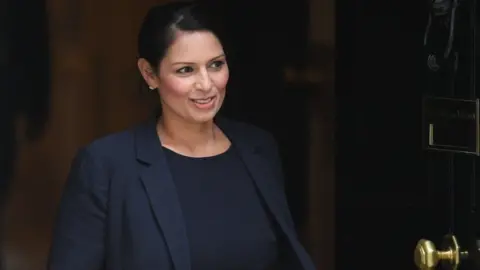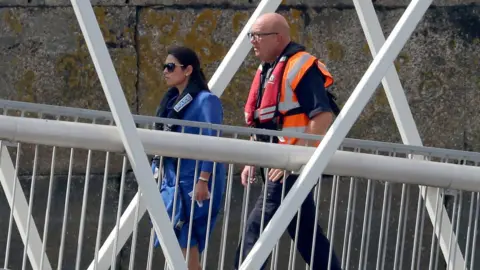Profile: Priti Patel
 PA
PAA high-profile figure in Prime Minister Boris Johnson's cabinet, Priti Patel was appointed home secretary in July last year.
A Eurosceptic, she was a leading figure in the Vote Leave campaign during the EU referendum.
Shortly after taking up the post of home secretary, she said she wanted criminals to "literally feel terror" at the thought of breaking the law.
A Cabinet Office inquiry into her conduct found that Ms Patel had "unintentionally" breached the ministerial code in her behaviour towards civil servants.
Her "approach on occasions has amounted to behaviour that can be described as bullying," the government's independent advisor on standards said.
Mr Johnson decided Ms Patel had not broken the ministerial code and could remain in her post as home secretary. Ms Patel said "I am direct and have at times got frustrated", but added: "It has never been my intention to cause upset to anyone."
The inquiry was launched in March 2020 after the resignation of the top civil servant at the Home Office, Sir Philip Rutnam. Sir Philip - who is suing for constructive dismissal - alleged staff felt that Ms Patel had "created fear".
As home secretary she has had to deal with several crises, including the London Bridge and Streatham stabbing attacks - later deemed by police to be terrorist incidents - and the deaths of 39 migrants in the back of a lorry in Essex.
She has also played a key role in drawing up a new points-based immigration system for after the UK's Brexit transition period, saying she wants firms to invest more in British workers "rather than simply relying on labour from abroad".
During the summer and autumn of 2020, she also took a leading role in negotiations with France over preventing a rising number of migrants crossing the English Channel.
 PA Media
PA MediaMs Patel, who is 48, also served in Theresa May's cabinet as secretary of state for international development.
Her appointment was greeted with concern by some in the aid community, who recalled that she had previously suggested that the department should be abolished and subsumed into a new trade department.
In post, she said she wanted the UK's aid budget to provide greater value for money. The aid department has since been merged with the Foreign Office.
She resigned from the role in 2017 after it emerged she had held undisclosed meetings with Israeli officials while on holiday. She acknowledged that her actions "fell below the high standards" expected.

Factfile
- Born: 29 March, 1972, in London
- Education: Watford Grammar School; economics degree from Keele University, postgraduate study in British government and politics at University of Essex
- Family: Born to Gujarati parents who fled Uganda in the 1960s.
- Career: Elected Witham MP in 2010. Became Treasury minister in 2014 and minister for employment in 2015. Appointed secretary of state for international development in July 2016. Appointed home secretary in July 2019, a post she still holds.

Born in London to Gujarati parents who left Uganda in the 1960s, she was educated at Watford Grammar School for Girls.
She went on to study at Keele and Essex universities before getting a job at Conservative Central Office, which she left to head up the press office for the Referendum Party, founded by Eurosceptic billionaire Sir James Goldsmith, from 1995 to 1997.
After William Hague became Conservative leader, she returned to the party to be his deputy press secretary, from 1997 to 2000.
She went on to spend a number of years working with the Weber Shandwick public affairs consultancy - reportedly advising Ikea, the Meat & Livestock Commission and British American Tobacco, among others.
She also had a spell as international public policy adviser for drinks giant Diageo.
Ms Patel sought to get elected to Parliament in 2005 but lost out in Nottingham North. A year later, she was one of those selected for new leader David Cameron's A-list of candidates and went on to become MP for Witham, Essex, in 2010.
Ms Patel achieved ministerial rank four years later as exchequer secretary to the Treasury, before promotion to employment minister following David Cameron's 2015 general election victory.
She is positioned on the right of the party - she voted against gay marriage, campaigned against the smoking ban, and previously advocated bringing back the death penalty, before later saying she did not support it.
Ms Patel, whose father stood as a UKIP councillor in 2013, names Margaret Thatcher as her political hero.
